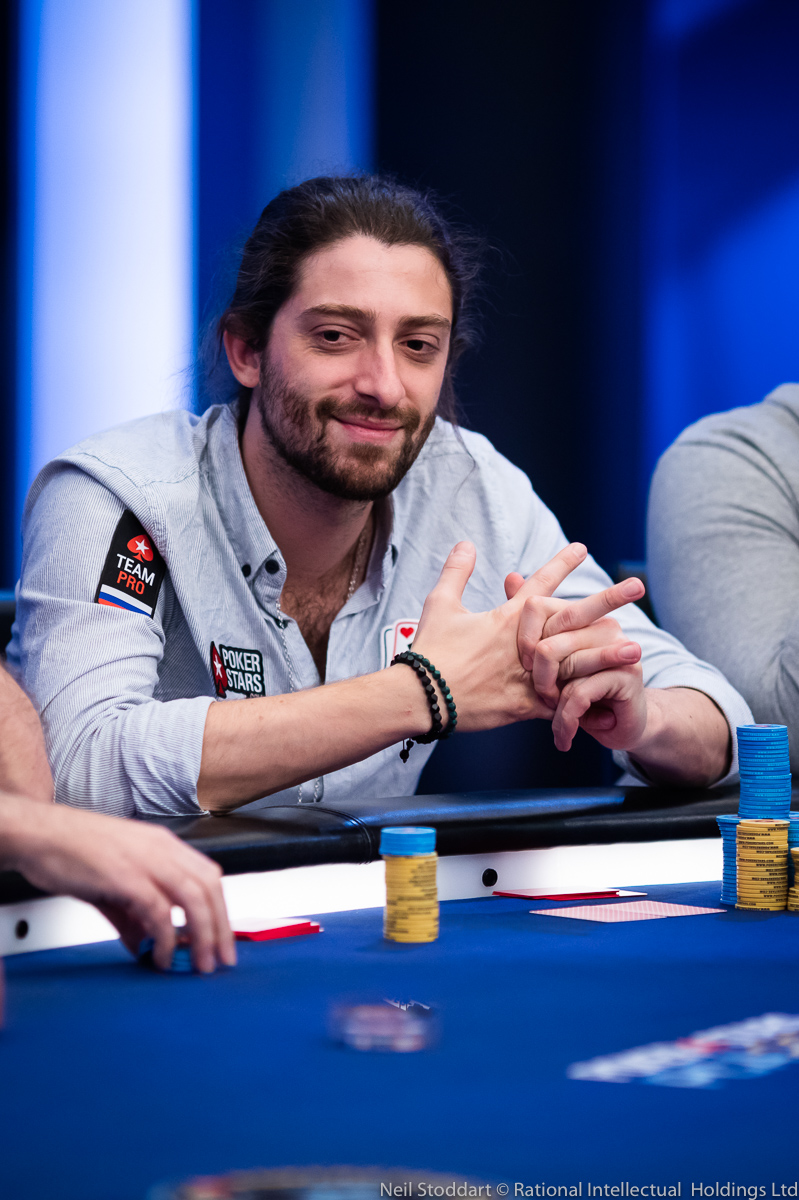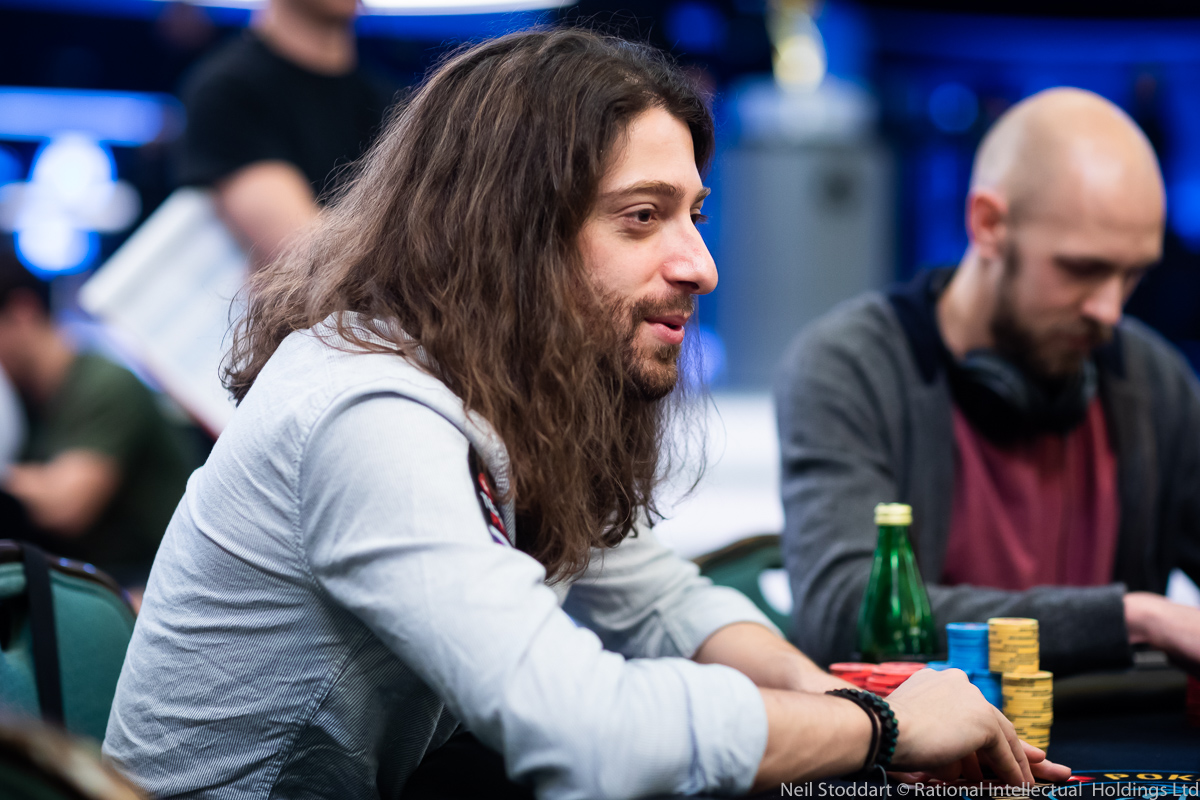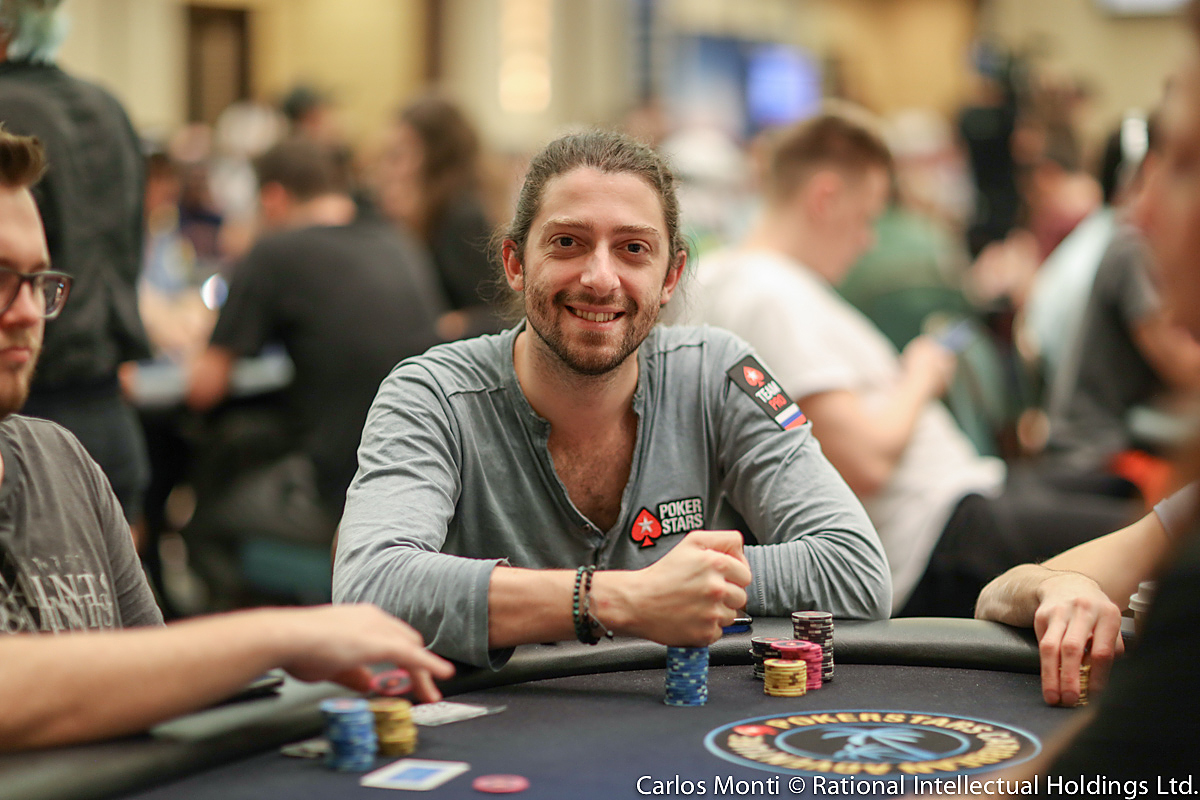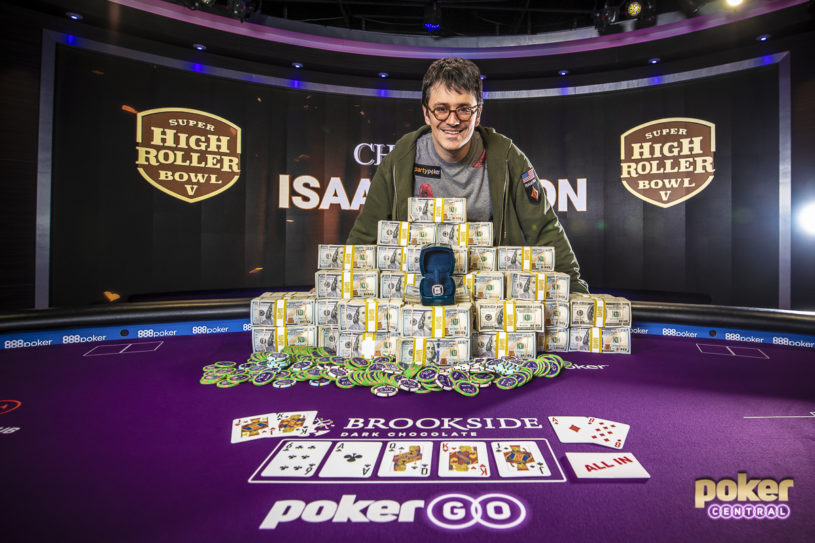
Meeting Igor Kurganov is like peeling the label off a bottle of kombucha that’s spent the last hour soaked in ice. He’s not a ‘quick shot’ type of guy, more chilled; a slow burn; a lie in the bathtub, a towel wrapped around your head, candles burning, incense rising kind of guy.
If you are the average of the five people you spend the most time with, then it’s not a bad idea to clone the guy, five times, and sit with the quintet, daily.
Poker.
People.
Presence.
We get into all three, and much more, during this interview, taken during the PokerStars Caribbean Adventure (PCA) where Kurganov made four final tables in the toughest tournaments on the planet.
We start by discussing the $25,000 PokerStars Player’s No-Limit Hold’em Championship (PSPC). I ask Kurganov where he would take this extraordinarily valuable event?
“This will be something that the Stars people need to figure out,” says Kurganov. “Given that it was a great success, I would be surprised if it was completely eradicated from the future.
“I would make it a little bit smaller, and try and do it yearly. I think giving away 320-Platinum Passes was insane. I think 100 would be enough, and you could add a whole lot of perks to the experience. Something needs to happen though because the experience was great.”
Kurganov is known for sticking a plastic gun in the backs of the greatest players in the live high roller scene, but there was a time when he had to grind it out online with every other dreamer. In the past few months, Kurganov has returned to his old stomping ground to compete in the PokerStars High Roller Club games.
When I picture Kurganov preparing for an online session I have this image of him sitting in a Herman Miller Aeron with 20 massage therapists rubbing each digit; a Buddhist monk in the corner banging a gong, and Tom Cruise creating a cocktail of kale, ginger and dragon fruit.
“I used to prepare as you describe during my two years of grinding up the stakes while going to university,” says Kurganov. “I would wake up, play all day, watch, read, do some poker content, eat a ton of frozen pizza, go to bed and wake up and do it again.”
I hope the frozen pizza had cauliflower crust.
“These days it’s a little bit different,” says Kurganov. “I Like what the High Roller Club provides, which is a few tables within a short amount of time. I live in the UK. I can start at 7 pm including the early 1k, or 9.30/10 pm. If I start later, with 4-5 tables of $500/$1000, I have an average play time of 1.5/2 hours. So it’s a short session, and even if you win it’s like four hours, so it’s neat. I enjoy jumping in, trying some stuff that I have studied, and playing against good players who consistently grind those.
“I don’t have rituals. I don’t touch my little cactus or stroke my monitor, but I like a clean workspace. I don’t want to have distractions within my visual field. My tables are very black, for example, so the information is the only thing that jumps out at me. I want to have had a good sleep, have coffee in me, close all the tabs, and make my workspace distraction-free.”
Talking about playing ‘distraction free’ poker, Kurganov has begun streaming his action on Twitch, which seems as ‘distraction free’, as trying to play as someone repeatedly presses the car cigarette lighter into your forearm, so I ask him how it’s affected his game?

“There hasn’t been an improvement in my game from streaming myself,” says Kurganov. “It’s true that if you teach or talk about your game over time, it will improve it, but I am not smooth enough on Twitch where I can focus on speaking, and that be valuable for me.
“I like the audience interaction, so it’s less about the game because we talk about life, science, Liv. It’s a lot about life and Liv. I talk about the game, but given the audience, it’s low-level explanations. I explain simple things first. I try to add complexity to it, like the PKO’s, I think quite a lot of people make a bunch of avoidable mistakes in those. I enjoy that part of it. I like the idea that there is a set of people interested in poker that make a lot of avoidable mistakes if they just had ten x two-minute sentences that could help them quite a bit, I think it evens out the field a little bit, and I think that would be better.
“By itself, it’s a live stream of ‘whatever’ with the ability to interact with the audience. That allows for pretty much anything. It would be even better if the audience interaction could be better. I was seeking to have more interpretable feedback for me along the lines of putting out a poll so people can vote, and I can adjust what I am talking about to suit. You could have thousands of people watching you, and a large percentage of people could answer those polls.”
I ask Kurganov if he had the chance to watch two players throwing bricks at each other during a heads-up duel, who would he like to see and why?
“For me, as long as I can see the cards, and it’s mostly about poker, I want to look at the best in the world playing against each other. All of my opponents play live or stream games, so I get to see how they are thinking about the game. It’s a great learning tool for anyone who wants to improve.
“If it’s about other stuff then Elon Musk playing against the Dalai Lamai. I would want them to play very slowly, and have lots of conversation.”
Next up, meditation.
What does Kurganov’s meditative practice look like?
“I used to do it more {meditation}, and more yoga, but then I fell out of the habit. It hadn’t built up strongly I guess,” says Kurganov. “The thing that stuck was general mindfulness when doing things, which is relatable. Trying not to have too many thoughts of the past and future when walking, and while eating food that’s pleasurable. It’s a nice way to receive happy experiences because you are there. You could be worrying about things, but instead, you are choosing to focus on the beauty of the moment.
“Another thing I do is s 30-60 second resets, where I try to calm my mind. It could be at a poker table, or during a break. Liv meditates more frequently than me. I’ve tried the Calm and Headspace apps. They are nice. I do like guided meditation. It’s easier when you have something to focus on.”
From meditation to podcasts.
Who is inside Kurganov’s ear daily?
“I listen to Sam Harris,” says Kurganov. “I used to listen to Tim Ferriss but stopped because I care about other things these days. With Sam, it depends on who is guests are. Listening to Sam’s voice is nice. It’s pleasing. I met him at TED and had dinner with him. Many people are against some of the points he is making and put bad ethics into his mind, and I think that’s ill-founded. He’s clearly a good human at heart.
“My favourite podcast is 80,000 hours with Rob Wiblin. They are closer to the EA community, and they frequently talk about far future thinking, existential risks, ethics, technology. They get top professors within their fields frequently, and other amazing guests. Rob is very smart and has good conversations with people. He had one with Hilary Graves that I liked, one with Amanda Askell, and they recently republished the one with Toby Ord, and Toby is fantastic. I also love Julia Galef’s ‘Rationally Speaking’ and Daniel Schmachtenberger’s ‘Future Thinkers’.
“Even if you don’t care about effective altruism and the other topics; they challenge your thinking. They think through topics they are discussing and are trying to be very careful about the statements they are making, and it’s a great exercise in how to think about problems, and to listen to people who are geniuses within their fields.”
Another excellent podcast to listen to is Seth Godin’s Akimbo Podcast, and recently Godin spent a few episodes, talking about the world’s broken education system.

I ask Kurganov for his thoughts on the subject?
“I haven’t dived too deeply into the topic,” says Kurganov. “It seems that we have an ill-devised system for the jobs that will exist in the future. You can educate yourself a lot online these days. Maybe the suboptimal education system might not be that bad as long as the social aspect is still at the forefront for the students. They can learn any course online, and read or watch whatever you want. Lectures can be interactive, where you can pause and answer multi-choice questions. It’s amazing. I am curious where it’s going to go.”
I ask Kurganov to describe some of the milestone moments in his life where he has changed?
“I got into effective altruism 5-6 years ago, and I have constantly been growing my interest in it. Therefore, I am doing more of the things I am interested in, and am very fortunate to be in this position. I thought I would have been more involved in classical business, or a start-up, and it might still be the case. I am releasing an app for bad accounting in poker — things like double confirmation from both sides, securing swaps into a legally binding contract. We will release a beta in a few days and have a full version out in a month or so.
“I’ve noticed some weaknesses in myself that have sustained over the years. I have flakiness. I get distracted by a topic, and I leave things behind. I couldn’t be in the founder or CEO type role. I need people who are more consistent, and I can sometimes jump in, and advise on something I have knowledge in.”
Kurganov has faced and conquered some of the best players in the world, but what about fear? What is the fear that Kurganov has overcome?
“I did a guided meditation in 2014 that exposed some of those with Shay Matthews in Australia,” says Kurganov. “He helped me find the state that I am the happiest and unhappiest, and noticing the fears that were present. I don’t believe there is one true self; I think there are many versions of me and it depends on the environment, etc.
“What came out, was there is not enough time, and that I am not good enough. So my fears are around sending out a blog post that’s not perfect, unfinished, non-perfect texts or messages, and it costs me too much time. It also relates to an ego that wants to appear smart or something.”
Continuing along the same theme, I ask Kurganov what’s been his toughest transition?
“I’ve been lucky,” says Kurganov. “I haven’t had any hard transitions. Poker allowed me to do the things I wanted to do. There has been no hard thing I have had to stick with. Hard things excite me. Maybe it’s a mindset thing, but mostly it’s because I don’t have to do hard things.”
I know that Kurganov has a strong network of friends, but I wonder if there was ever a time that he was lonely, and what his thoughts are on loneliness both in poker and life?
“Fortunately, it’s something we are talking about more. It’s not often noticeable from the outside, and it can eat away at you for years. I suffered loneliness during the first year at university because I didn’t connect as I came in later. Other periods of isolation I’ve experienced was when I had a huge downswing – won my first million and lost it. I didn’t do the things I wanted to do back then, but that’s still quite weak in comparison to what loneliness can be. Losing your whole community, that’s rough.
“When I was in school in Germany I worked at a soup kitchen. Germany has a great welfare system, and anyone who lives on the street can get a home, and are helped with work and a minimal amount of money. We still had a few homeless people. I learned the reason was that these people had a community, and if you give them shelter or a home they are no longer a part of this community, and they become lonely.“It seems it’s worthwhile to not have a home rather than be lonely.””
Moving on from loneliness, I ask Kurganov for his views and advice on building a strong network.
“Different things work for different people,” says Kurganov. “There are some who are methodically getting connected to people, and that’s all fine, but I like a different approach. If you incrementally work on oneself, then things fall into place. If you do interesting things, you will meet interesting people. You might not meet someone directly, but you will meet someone if you go Bouldering for example. It’s a great sport where everyone is super helpful and kind, or maybe a yoga class.
“Loneliness is often connected to depression, and it’s harder then to connect. A friend of mine went through it where everything went bad. What he did was grind away at every aspect of it. He started on the meaning, interests and mental fortitude. He read more interesting things rather than watch Netflix. He became interested in the world. On relationships, he tried harder to make the first connection. And for the wealth he was trying to grind lower stakes, study the game. I think it’s about incremental improvements. If there were one thing, it would probably be falling in love with the ideal partner, but you’re less likely to have an interesting relationship with your partner if you haven’t worked on your self. Yoga, mindfulness, meditation, thinking about interesting problems, learning a new language, coding – it applies to everything.”
Kurganov is the founder of Raising for Effective Giving (REG), a non-profit that helps reduce suffering in the world. I ask him how it makes him feel to serve others?
“When I was at the soup kitchen, I could see the people I was helping. My charity is more removed from the empathetic aspect, but I believe in the numbers that it works, and the numbers make me happy. I am redefining it because of the word ‘serve’. I am not there to give the thing at the end, but you don’t need to be to feel that you’re contributing or are actually contributing. Overall, the thing that helped me the most was at different times going through a downswing, not being sure about poker, at least I know some good comes out of the experience. Something scary happens on a plane journey, at least my life wasn’t for nothing. It helps me be happier, calmer, and it’s recommended if you feel bad about yourself to go and have a walk in nature, work on your long term project, and call your grandmother and have a five-second conversation to make her happy. You see your value then. It’s good to feel good about yourself doing good things.”
Links
80,000 Hours Podcast – https://80000hours.org/
80,000 Hours Podcast Featuring Hilary Graves – https://80000hours.org/
80,000 Hours Podcast Featuring Amanda Askell – https://80000hours.org/
80,000 Hours Podcast Featuring Toby Ord – https://80000hours.org/
Julia Galef’s Rationally Speaking – http://
Daniel Schmachtenberger’s podcast Future Thinkers – https://futurethinkers.org/
Seth Godin’s Akimbo Podcast – https://www.akimbo.me/
Raising for Effective Giving – https://reg-charity.org/





